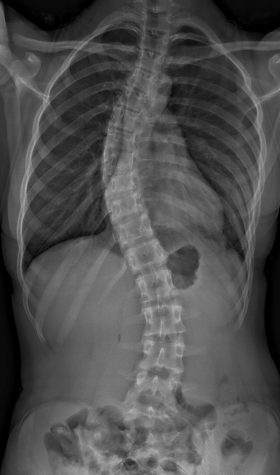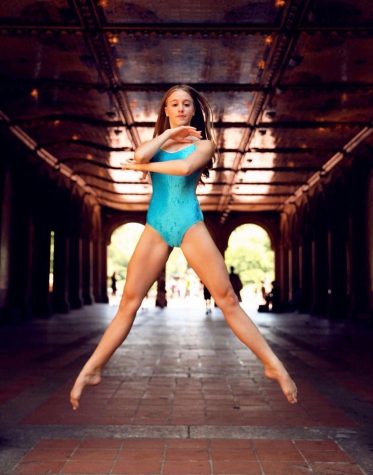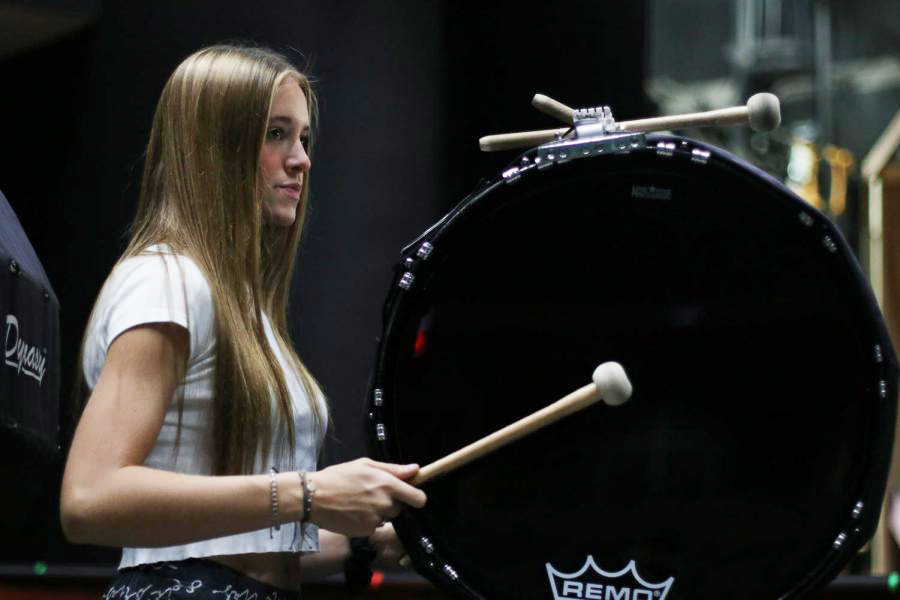No Backing Down
November 14, 2019
Over 350 band students form a single file line, goofing around and talking with the other bands while waiting to file onto the field for the presentation of awards. Freshman Lauren Bond walks and talks with her friends, still high on the adrenaline of her first band competition, when one of her ribs suddenly slips out of place. She can’t breathe, she can’t push it back into place and with every second that passes, the pain grows worse and worse. Panicking, she lies on the ground and finally gets it to pop back in. She takes a deep breath.
Ribs popping out of place are just one of the side effects of Bond’s advanced scoliosis: the angles of her S curve are currently 18 and 47 degrees. Bond doesn’t let her back hold her back, though. She danced competitively for 12 years and now marches bass drum 3, weighing about 30 pounds, for the band.

Bond’s scoliosis was caught in a school screening when she was about 8 years old. The curvature has worsened over time, but her doctor told her marching bass drum wouldn’t exacerbate the situation.
“Marching a show is fine, but long rehearsals are what really kills me,” Bond said. “It just hurts having to carry the drum constantly, and I can never put it down. I have to take breaks on the side so I can stretch and give my back a break. I like marching bass drum, but bass 3 hurts. I’ve built up my strength to it in my back, but of course it’s going to hurt. It’s just part of life. I could do anything and my back will still hurt.”
Percussion director Zach Houston said he thinks Lauren has faced these challenges the best she could and has hopes for her future in the percussion program.
“I hope to see Lauren recognize her value as a percussion student a little more,” Houston said. “I would also like to see her grow as a young learner and understand that things aren’t going to be perfect all of the time, and she has to fight through some of the hardships that go along with being a battery player in such a competitive environment.”
Senior Gillian Witten acts as a mentor to Bond because she also has scoliosis and tried to march snare drum her freshman year, but switched to marimba because it was too painful for her. Witten got spinal fusion surgery in November of her sophomore year to correct her scoliosis and advises Bond about pain management as well as guiding her on her own path toward surgery.
“She’s kind of like my child – I’ve adopted her,” Witten said. “It’s such a difficult thing and people don’t understand. It’s not something people can necessarily see – it’s not a visible thing – so sometimes you don’t like to complain about it because people can be like, ‘Oh, you’re just complaining.’ People aren’t sympathetic about it a lot of the time.”
Witten said she is proud of Bond because she’s doing what she wasn’t able to do.
“She’s really risen to that challenge and she has a lot of resilience,” Witten said. “At the beginning of the season, it was painful for her and hard for her to keep going, but now she’s grown in pain tolerance. I can only imagine that she’s gotten used to it. She’s really doing so well with it.”
Bond is planning on getting a spinal fusion operation like Witten during her junior year. Her parents are encouraging her to wait so she can have a ‘normal’ high school life before the one to two month recovery and aftermath of the surgery, even though doctors have encouraged her to go through with it as soon as possible.
“I don’t know how I feel about it – I’ve never gotten surgery before,” Bond said. “I did a lot of research myself about it and what they were going to have to do, especially because my mom was freaking out about it and she was freaking me out. I don’t think it’s going to be that scary if [the surgeons] know what they’re doing.”
Bond said she loves being in percussion because they have even more competitions than the band. Her competitive streak may be a remnant of her 12 years dancing for the company team at Dance Industry. She competed with the company at the New York City Dance Alliance this past summer with four dances and a solo, too.
“I did everything you could think of: ballet, tap, everything else,” Bond said. “I had 3-4 hours of dance every night other than Friday, and I’d have private lessons on Sunday. It was the biggest time commitment I’ve ever had to deal with. There was a competition every weekend and you have to stay there for the whole day.”

Bond gave up dance this summer after NYCDA so she could march because her family encouraged her to try drumline. She planned to get back into dance in the spring and take some classes again for fun, but she has doubts about having time in her schedule, especially with her class load.
“I don’t think I’m ever going to go back into dancing competitively,” Bond said. “To me, dancing and being in music is a hobby. That’s the way my parents raised me- to focus on my education first. I might continue to do band, but I might not depending on how my back feels. I don’t know what I’m going to do.”
Bond is also an all AP and PreAP student focused on becoming a doctor one day — maybe a neurologist.
“I didn’t want to do neuro because I thought it was all brain, but then I figured out it was spine, too, and I thought it would be really cool,” Bond said. “I already know a lot about it because of my scoliosis, and I could help other people like me.”
